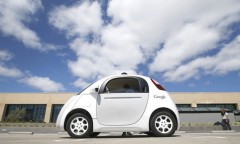By Steve Pak, | March 05, 2016

Mind-Controlled Wheelchair
University researchers have designed and built a robotic wheelchair that is totally controlled by the thoughts of the user, which were two lab monkeys in their study. The prototype system uses an implanted Brain-Machine Interface (BMI) instead of a scalp-attached electroencephalogram (EEG).
Duke University researchers conducted the study and the findings were published in the journal Scientific Reports.
Like Us on Facebook
BMI is more invasive than EEG but provides a higher amount of command and less lag. Study leader Dr. Miguel Nicolelis told Business Insider the researchers wanted the prototype to be close to the way a totally paralyzed human moves, according to Engadget. Users can control each movement at one time.
The Duke team first implanted the wireless BMI unit in the test subjects and then recorded the monkeys' brain waves while they drove them around in the wheelchair.
This data was used to make an algorithm that converts the monkeys' goals into electrical signals that operate the machine. Then the researchers gave control of the chair to the lab animals.
The monkeys became good drivers in less than one day. They were able to guide the wheelchair towards the reward of a bowl of fruit.
Researchers hope that one day the tech can be tweaked for human use. While paralyzed people could become mobile again by using artificial limbs, the first goal is to solve the issue of the 2-hour battery life.
Last year Chinese researchers developed a system that uses brain signals to operate a mind-controlled car, according to Telegraph. The researcher could drive a car forward, in reverse, brake, and lock/unlock doors.
The system is operated by using a headset with 16 EEG-reading sensors in the driver's brain, and then uses software to translate them into instructions.
Originally the idea was developed for paralyzed or elderly drivers who do not have full control of their bodies. Researcher Zhang Zhao told Reuters the goals of the project are to provide a hands-free driving method for disabled people, and a more mental driving mode for healthy people.
Researchers noted that a non-focused mind would not cause a car crash as the brain would only change the status of the vehicle.
-
Use of Coronavirus Pandemic Drones Raises Privacy Concerns: Drones Spread Fear, Local Officials Say

-
Coronavirus Hampers The Delivery Of Lockheed Martin F-35 Stealth Fighters For 2020

-
Instagram Speeds Up Plans to Add Account Memorialization Feature Due to COVID-19 Deaths

-
NASA: Perseverance Plans to Bring 'Mars Rock' to Earth in 2031

-
600 Dead And 3,000 In The Hospital as Iranians Believed Drinking High-Concentrations of Alcohol Can Cure The Coronavirus

-
600 Dead And 3,000 In The Hospital as Iranians Believed Drinking High-Concentrations of Alcohol Can Cure The Coronavirus

-
COVID-19: Doctors, Nurses Use Virtual Reality to Learn New Skills in Treating Coronavirus Patients











